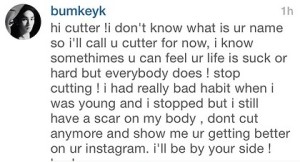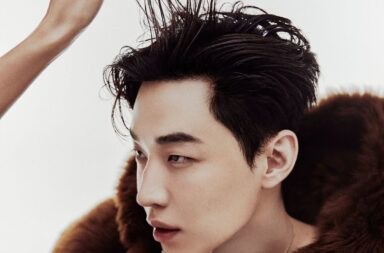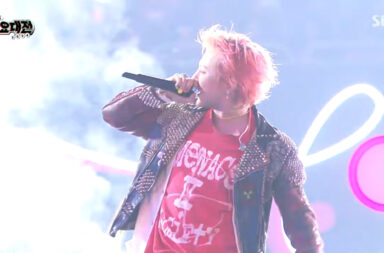 International K-pop fans are sometimes left with a bitter taste in our mouths due to problematic comments or behaviours from idols. These are feelings that have recently been reignited due to Wendy‘s parody of African-Americans and Zico‘s homophobic slur in “Tough Cookie,” bringing to light the social attitudes that still need a bit of work. In addition to sometimes propagating negative cultural attitudes towards certain demographics, idols hardly ever seem to use their celebrity for good by promoting positive attitudes. This is understandable in the tightly regulated K-pop industry, where the amount of time and money invested into each idol means that they must be stopped from saying anything controversial that may affect their careers. This of course means that the glossy world of K-pop ends up sweeping a range of social issues under the carpet of political correctness. This includes issues such as the heteronormative mindset which invalidates the LGBT community, the tendency to hush up mental health issues, and the pressure of unrealistic physical ideals. All these things can be a reflection of issues in the society at large, or can negatively contribute to fans’ perceptions of how they should look, feel and behave.
International K-pop fans are sometimes left with a bitter taste in our mouths due to problematic comments or behaviours from idols. These are feelings that have recently been reignited due to Wendy‘s parody of African-Americans and Zico‘s homophobic slur in “Tough Cookie,” bringing to light the social attitudes that still need a bit of work. In addition to sometimes propagating negative cultural attitudes towards certain demographics, idols hardly ever seem to use their celebrity for good by promoting positive attitudes. This is understandable in the tightly regulated K-pop industry, where the amount of time and money invested into each idol means that they must be stopped from saying anything controversial that may affect their careers. This of course means that the glossy world of K-pop ends up sweeping a range of social issues under the carpet of political correctness. This includes issues such as the heteronormative mindset which invalidates the LGBT community, the tendency to hush up mental health issues, and the pressure of unrealistic physical ideals. All these things can be a reflection of issues in the society at large, or can negatively contribute to fans’ perceptions of how they should look, feel and behave.
In light of all of this, there is nothing as refreshing and uplifting as idols who speak up about these issues, putting themselves on the line to promote positivity. Public statements on controversial issues are incredibly rare, and when it is done, it sets a positive precedent. Seeing as thousands of fans effectively idolise K-pop idols (hence the name), social change can gradually make its way into society thanks to the actions of idols. Thankfully, we have a handful of idols to look up to in this regard, and what’s more, these idols have the potential to further redirect the public discourse in Korea.
Increasing acceptance of the LGBT community is one of the areas where public support from idols can really make a difference. The list of powerful idols who in some way promote acceptance of the LGBT community or don’t conform to gender norms include idols such as Heechul and Jo Kwon, facing a fair bit of backlash themselves for these views.
 SHINee as a group have made a series of notable moves which show their potential to break down social stigma. One of Jonghyun‘s greatest credits is his support of the LGBT movement, a particularly moving example of this being the Anneyong Student Protest. In a Twitter DM to the transgender student organising the event, Jonghyun wrote:
SHINee as a group have made a series of notable moves which show their potential to break down social stigma. One of Jonghyun‘s greatest credits is his support of the LGBT movement, a particularly moving example of this being the Anneyong Student Protest. In a Twitter DM to the transgender student organising the event, Jonghyun wrote:
As an entertainer, as another kind of minority facing the public, I feel at loss towards a world that does not accept differences… I support you for speaking out that different doesn’t mean wrong.
Jonghyun’s statement that being different isn’t inherently a bad thing can also be applied to different aspects of Korean society, such as the pressure to obtain unrealistic physical ideals. Jonghyun rather frankly questioned: “What is wrong with being ugly? Life is not all about the looks.” In an industry as image conscious as K-pop, this kind of statement is a breath of fresh air to fans who feel inadequate compared to their apparently ‘perfect’ biases.
The good vibes seem to be a recurring theme in SHINee, with member Key voicing his thoughts on mental health. South Korea’s mind-bogglingly high suicide rate shows the nation’s dire need of reducing the stigma associated with mental illnesses. Key left the following comment on a self-harming Shawol’s Instagram profile, extending support to her and hinting at his own issues regarding this taboo topic.
In the idol world of S-lines, X-lines, crash diets and leeks for meals, K-pop is not known for its promotion of healthy body image. Thankfully, there are idols who demonstrate positive body image despite not being the physical ‘ideal’, or are quick to rebut the idea that idols should be physically perfect.
One such example is Lee Gook-joo, who embodies positive body image messages by refusing to conform to the gimmicky and offensive image of what someone who doesn’t fit the ideal should behave like. In her case, she fabulously contradicts the idea that women who aren’t a size 0 can’t be gorgeous and confident.
Another great example is f(x)’s Amber, who stepped up to the defence of fellow member Sulli when a man told her that she should lose weight. Amber was fired up by the man’s comment, telling him that “It’s not right to hurt other people because of your own standards.” This is a message that the visually homogeneous K-pop industry certainly needs to take on board, with Amber herself being the perfect example of a unique kind of beauty.
[youtube http://www.youtube.com/watch?v=d84AY65gmK8]These few snippets of positive messages that promote increased acceptance of the LGBT community, openness regarding mental health and positive body image may not seem like much at first glance, but are a great starting step to gradual social change. Pop culture is the most prolific form of media in any society, and therefore a great vehicle for spreading positivity. With more and more idols exposing social issues or expressing uplifting opinions, K-pop can be turned into a positive force, rather than one riddled with countless examples of colourism, sexism, homophobia, and all the other horrible ‘isms’ and ‘phobias’ you can think of.
(YouTube, Black K-pop Fans, Images via SM Entertainment)



